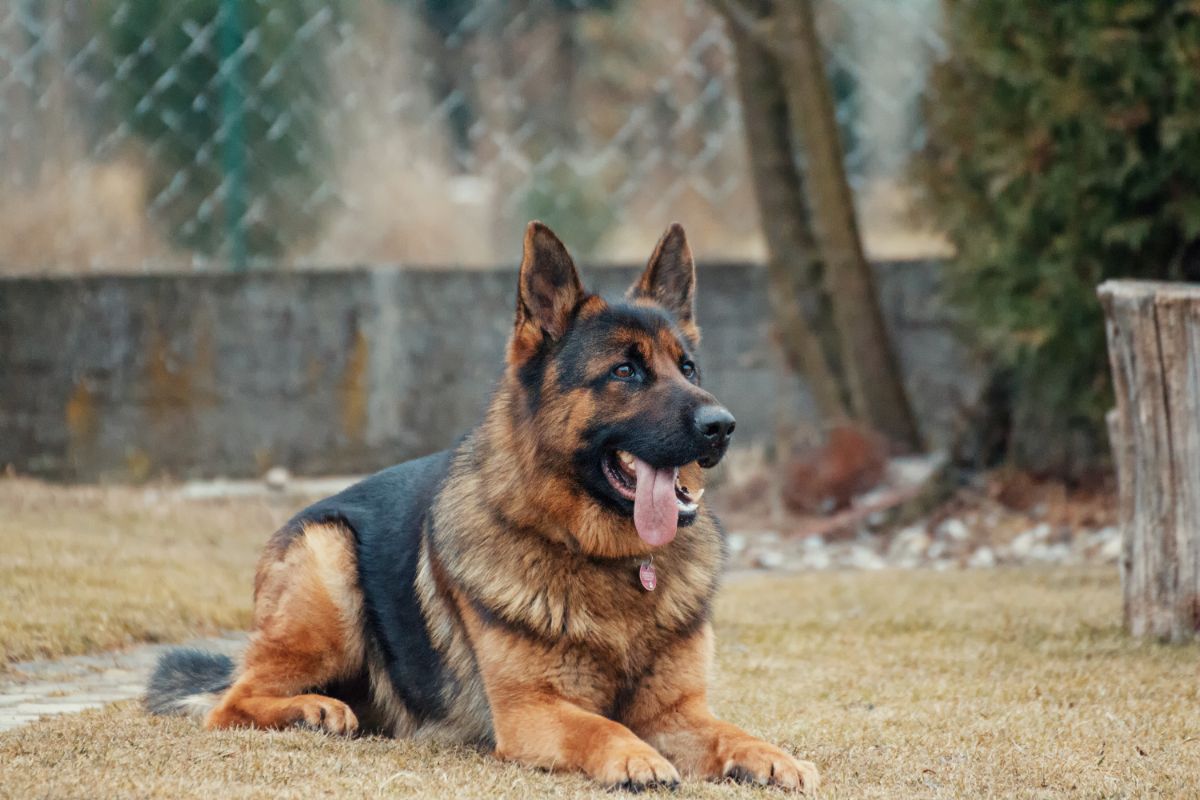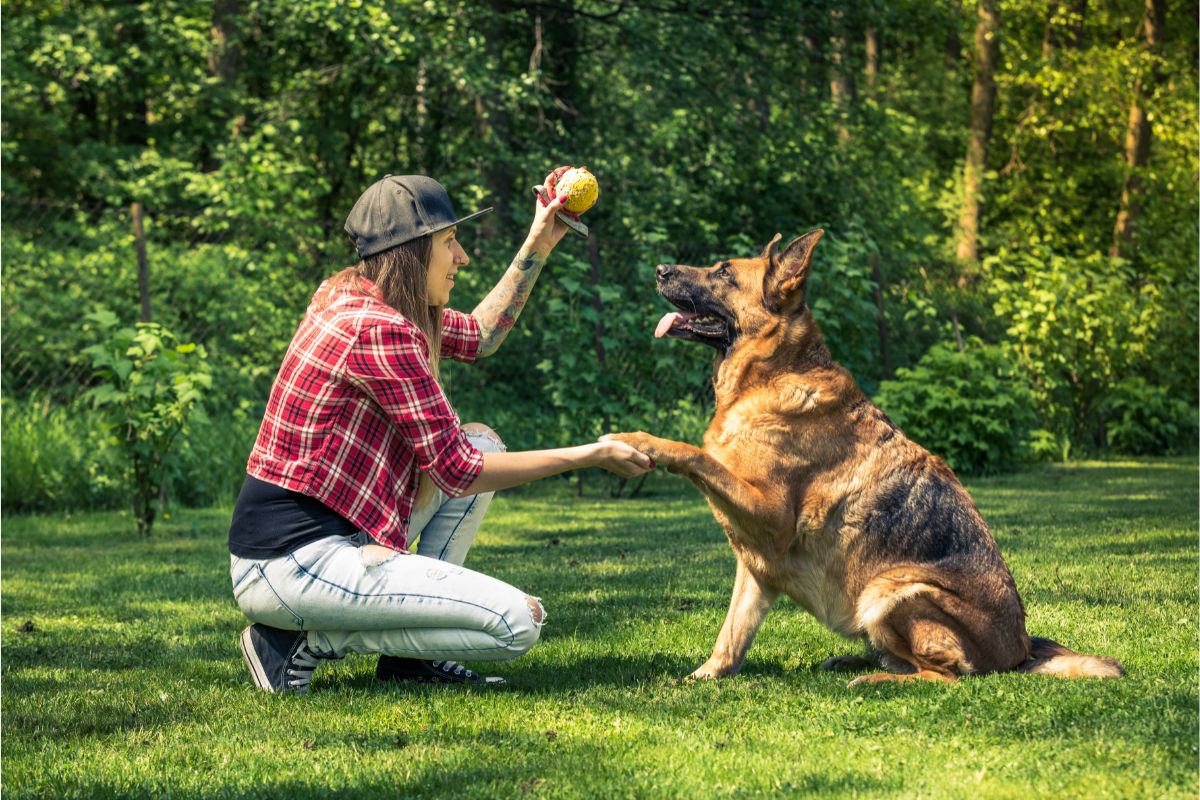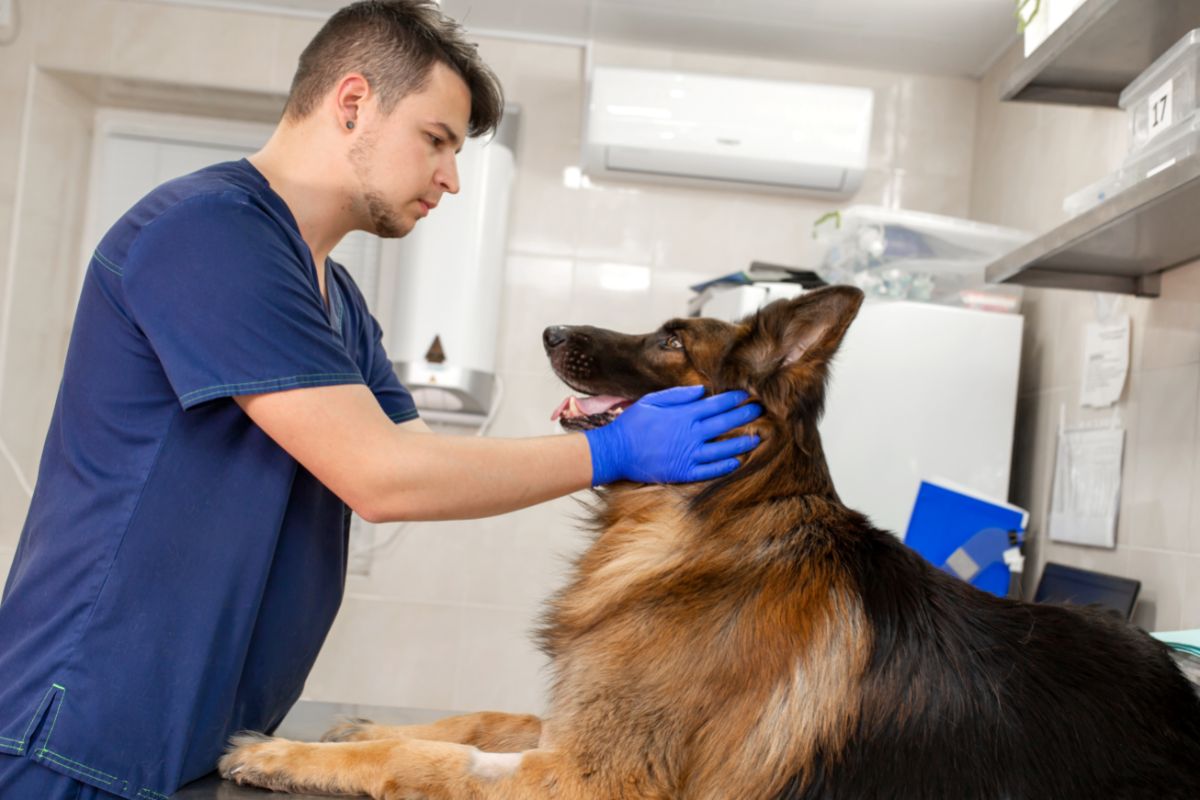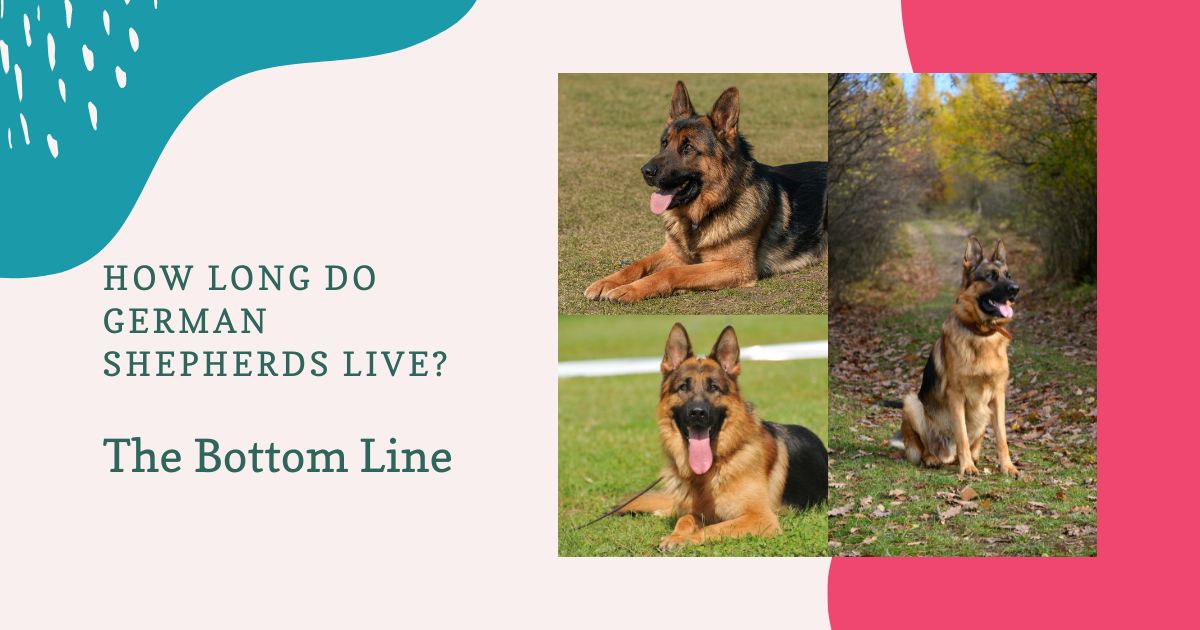The German Shepherd
As a German Shepherd owner, you may be wondering, how long do German Shepherds live? Most of them live for an average of 10 years. They’re intelligent, flexible, and trainable. Due to these factors, German Shepherds are usually working dogs.
The average weight for a German shepherd is between 50 and 90 pounds (22.7 and 40.8 kilograms), depending on their gender, making them one of the large dog breeds.

How Long do German Shepherds Live?
Even though it hasn’t won any awards for bravery, your German Shepherd is, without a doubt, the most prestigious pet in your eyes. Understandably, the thought of life without your German Shepherd may fill you with dread. However, unlike other more common breeds, this one does not have a particularly long life expectancy.
It’s a harsh but inevitable truth. Having this knowledge, however, can assist you in providing the highest quality of life to your dog.
Let’s look at the life expectancy of the German Shepherd and the best ways to ensure that they remain healthy for as long as possible. One study that most people frequently quote places the longevity of German Shepherd Dogs at exactly 11 years. Another study that is more recent than the first corroborated this fact with a median age of 10.95 years.
Therefore, if you take good care of your German Shepherd, you can anticipate receiving love and making memories for at least ten years. Please continue reading for more information on how to care for this breed so that it lives a long and healthy life!
The Oldest German Shepherd to Date
On record, the longest-living German Shepherd lived for 18 years. Diet, exercise, and regular visits to the veterinarian are three of the best ways for owners of German Shepherd Dogs to extend their pets’ lives and enjoy more time with them.
Factors That Affect German Shepherd Lifespan
Different things play a role in determining the German Shepherd’s life expectancy. They include the following:
Diet
You can improve your German Shepherd puppy’s health by giving it a well-rounded diet. Providing large-breed puppies with the best diet formula is important to promote healthy joints. Adult canines have specific calorie needs that you must meet. However, excessive amounts of calories are not fit. Also, to improve the health of senior dogs, you will require a different formulation.
Overeating can be a contributing factor in the development of obesity, which, in turn, can negatively affect your dog’s general health.
Exercise
Puppies require adequate activities in addition to nourishment. According to the opinions of several dog experts, a GSD three months old can walk for fifteen minutes, while a GSD one-year-old can exercise for an hour. However, you should not allow them to play on the stairs or other hard surfaces.
If your dog’s joints are overworking from a young age, they may develop hip dysplasia. This painful condition can lead to limping.
After two years, you should start giving your dog intense exercise for at least an hour or two every day. This will ensure that they remain in tip-top form. Dogs can develop behavioral and health problems if you do not stimulate them sufficiently.
Breeding
Breeding practices impact the average lifespan of a German Shepherd dog. The disposition and usefulness of a dog are more important to breeders than its outward appearance. Notably, recessive genes cause most diseases, so you should practice inbreeding to preserve your dog’s qualities. Also, intense reproduction may be responsible for this problem.
To develop the perfect dog, the breed’s namesake, Max von Stephanitz, employed a technique known as line breeding. Many consider line breeding a safer option than breeding animals from their siblings. This increases the German Shepherd’s lifespan while maintaining its favorable characteristics.
However, years of competing in conformation shows sanctioned by the American Kennel Club have taken their toll on the dog’s posture, performance, and longevity. The tiny back slope, as a result of overbreeding, led to the development of a deformity. There is a possibility that excessive back sloping will result in health issues.
Training
Both improper training and neglect can lead to behavioral problems in your dog and shorten its lifetime. An untrained dog may make you uncomfortable, and much like puppies, they tend to chew everything in sight. Accidentally taking in the wrong substance could be lethal.
Dogs that have been through training know how to behave properly and won’t consume items they shouldn’t.
Most people who possess a hostile dog, particularly one as massive and strong as a German Shepherd, choose to have their pet put down. Therefore, even when training security dogs, socialization is very important.
The German Shepherd Dog is popular for its fidelity, power, intellect, and dedication to its masters. They must spend the first few months and years of these puppies’ life receiving proper training and attention to ensure a long and fulfilling relationship with this exceptional breed of dog.

Causes of Death in GSDs
Although German Shepherd dogs can inherit some health problems, the breed as a whole is generally healthy. However, epilepsy, hip, elbow, and spine dysplasia, and bloat are the most frequent conditions.
GSDs typically suffer from mild skin, stomach, ears, and eye conditions. Exocrine pancreatic insufficiency (EPI) is also common in German Shepherds. It is one of the primary reasons why it is important to offer them moderate kibble.
Your veterinarian should examine your dog for heart disease and autoimmune thyroiditis during routine examinations. Your dog’s life is safe if you use preventative care on them and make an early diagnosis of any health problems. Your dog should also undergo screening for both bone cancer and hemangiosarcoma.
The German Shepherd’s Lifespan Compared With Other Breeds
Although German Shepherds may not have longevity, their peers of the same size can have a life expectancy of as little as nine years.
The average lifetime of other dog breeds is shorter than that of the German Shepherd. For example, they can outlive the Golden Retrievers.
Is a German Shepherd the Right Dog for Me
German Shepherds, especially females, have a reputation for being a stern dog breed. However, they have a gentle disposition and get along well with youngsters. Read our article and find out What is a Short-Haired German Shepherd?
Male dogs can be less tolerant of most physical plays, so it’s important to keep an eye on them, especially if they weren’t raised with kids and aren’t particularly well-trained.
German Shepherds cannot exhibit any signs of violence if they have been properly socialized and taught. It is essential for them to treat children with kindness while remaining tough.
GSDs can become spoiled and disobedient if not properly socialized and trained. Notably, adult dogs are quite active and need a lot of exercise. However, you should not overwork puppies because they are still growing and developing. Instead, gradually encourage them to adopt a more active lifestyle.
Taking GSDs for walks every day is crucial, and you should also provide plenty of space for them to run around. They can become destructive and bored when left alone for too long, just like most working dogs.
Overall, always inquire from Vets in your area whether this breed would be appropriate for your family’s lifestyle.
Keeping Your GSD Happy and Healthy
Even with all of your best efforts, you won’t be able to keep your German Shepherd safe from everything. Some diseases run in dog families, and growing older is an inevitable part of dogs’ life. On the other hand, there are some things you can do to ensure that your German Shepherd leads the happiest and healthiest life possible throughout its whole existence:
Exercise regularly
The German Shepherd is a breed prone to obesity, so regular physical activity is very important for weight management in this dog species. Additionally, exercises prevent coronary disease in dogs.
The quantity of exercise that is necessary for your German Shepherd can vary depending on the individual dog. Sometimes, the exercises can take several hours. Your canine companion can get some exercise in a variety of ways, including the following:
- Long walks
- Playing with other dogs
- Competitions in agility
- Puzzle toys
- The playing of fetch
- Swimming in protected bodies of water like lakes or pools
Diet
You should feed your German Shepherd a dog food that has approval from the AAFCO and is nutritionally complete. It is best to discuss the amount and frequency of feedings for your German Shepherd with your trusted veterinarian.
Veterinarians recommend that you feed German Shepherd puppies growth food formulated for large breeds. Their pace of growth may slow down as a result of the meal, but they will still attain the size typical for their breed. Also, it may lessen the likelihood of developing hip dyslexia in later years.
Vet Visits and Immunizations
It is important to visit the veterinarian consistently because early health interventions lead to better outcomes. In addition, you can entirely avoid some diseases such as rabies and heartworms. Vaccinations on schedule and monthly preventative care will assist in reducing the occurrence of conditions that are not necessary.
Cleaning of the Ears
Ear infections are common in German Shepherds because of their long ears. Cleaning every week can remove the buildup of bacteria and debris that can cause inflammation and illnesses.
Dental Care
Dental illness in a dog can make eating painful for the dog as a whole and can change the dog’s eating habits. According to veterinarians, the easiest strategy to reduce the number of bacteria in a dog’s mouth is to brush at least once every day for one minute.

Our Parting Words
German Shepherds are obedient, kind, and easy to train pets. Others enter the field of public service by joining the military or training to become guide dogs. Others are merely companions, and that is perfectly satisfactory.
However, the average lifespan of a German Shepherd is significantly shorter than that of other breeds. The German Shepherd’s life expectancy is between 7 and 10 years, which is lower than that of other dog breeds of similar size.
Musculoskeletal problems are more common in German Shepherds than in other dog breeds. DSDs are also vulnerable to obesity. In general, large dog breeds have a higher risk of developing cancer than smaller breeds.
Overall, the German Shepherd is an excellent companion for both jogging and swimming. Always reduce the likelihood of certain dog health problems by ensuring that your GSD consumes nutritious food and gets plenty of exercises.
The things you should also do for it include regularly taking it to a veterinarian for checkups, having its ears cleaned once a week, and brushing its teeth every day.


5 thoughts on “How Long Do German Shepherds Live? The Bottom Line”
Comments are closed.